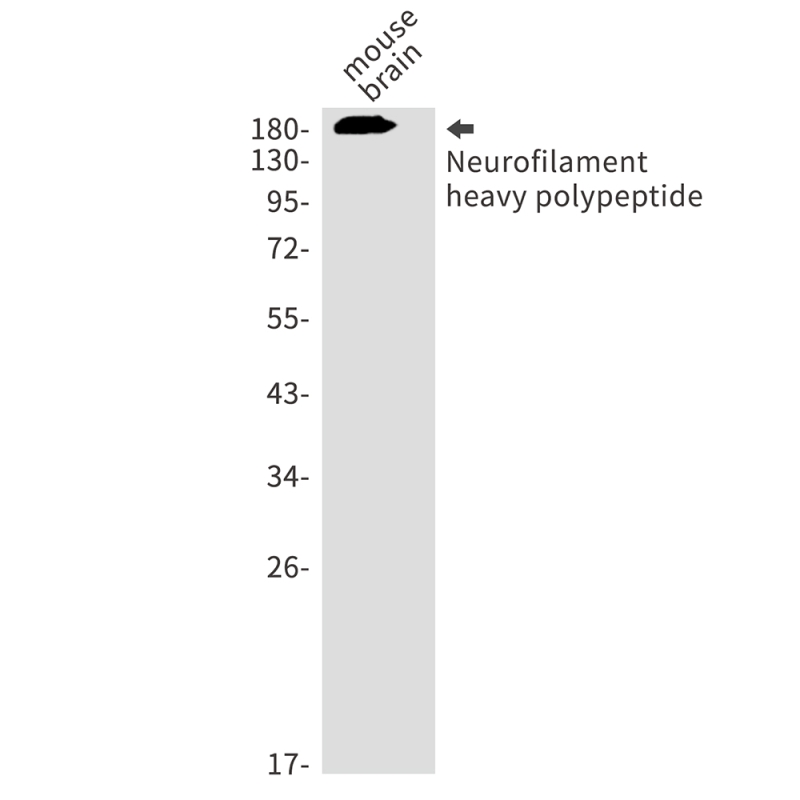
| WB | 1/500-1/1000 | Human,Mouse,Rat |
| IF | 咨询技术 | Human,Mouse,Rat |
| IHC | 1/50-1/100 | Human,Mouse,Rat |
| ICC | 1/50-1/200 | Human,Mouse,Rat |
| FCM | 咨询技术 | Human,Mouse,Rat |
| Elisa | 咨询技术 | Human,Mouse,Rat |
| Aliases | NEFH; KIAA0845; NFH; Neurofilament heavy polypeptide; NF-H; 200 kDa neurofilament protein; Neurofilament triplet H protein |
| Entrez GeneID | 4744 |
| WB Predicted band size | Calculated MW: 112 kDa; Observed MW: 180-220 kDa |
| Host/Isotype | Rabbit IgG |
| Antibody Type | Primary antibody |
| Storage | Store at 4°C short term. Aliquot and store at -20°C long term. Avoid freeze/thaw cycles. |
| Species Reactivity | Human,Mouse,Rat |
| Immunogen | Recombinant protein of human Neurofilament heavy polypeptide |
| Formulation | Purified antibody in TBS with 0.05% sodium azide,0.05%BSA and 50% glycerol. |
+ +
以下是3-4条关于Neurofilament Heavy Polypeptide(NEFH)抗体的参考文献及其摘要概括:
---
1. **"Structure and function of neurofilaments"**
*Lee, V.M., Cleveland, D.W.*
摘要:本文系统阐述了神经丝蛋白(包括NEFH)的结构和功能,强调其在维持神经元轴突形态和运输中的关键作用,并讨论了特异性抗体在检测神经丝磷酸化状态及病理研究中的应用。
2. **"Neurofilament markers in CSF and blood as biomarkers of neurodegeneration"**
*Yuan, A., et al.*
摘要:研究探讨了神经丝蛋白(如NEFH)在脑脊液和血液中的水平变化与神经退行性疾病(如ALS、阿尔茨海默病)的关联,验证了NEFH抗体的灵敏度和特异性在临床诊断中的价值。
3. **"Phosphorylated neurofilament heavy chain antibodies distinguish pathological subtypes of motor neuron disease"**
*Perrot, R., et al.*
摘要:通过对比不同NEFH抗体的免疫反应性,研究发现磷酸化特异性抗体可有效区分肌萎缩侧索硬化症(ALS)与其他运动神经元病变,为病理分型提供了分子依据。
4. **"Monoclonal antibodies distinguish phosphorylation-dependent and independent neurofilament epitopes"**
*Sternberger, L.A., Sternberger, N.H.*
摘要:经典研究报道了针对NEFH不同磷酸化表位的单克隆抗体的开发,揭示了其在神经发育、轴突损伤和神经退行性疾病模型中的差异化检测能力。
---
以上文献涵盖基础机制、生物标志物开发及抗体特异性研究,可作为NEFH抗体相关研究的参考。
The neurofilament heavy polypeptide (NfH), encoded by the *NEFH* gene, is a key structural component of neuronal intermediate filaments, primarily expressed in mature axons. As the largest subunit (~200 kDa) of neurofilaments, it plays a critical role in maintaining axonal caliber, mechanical stability, and intracellular transport. NfH contains a highly phosphorylated C-terminal tail, which regulates interactions with other cytoskeletal elements and organelles. Antibodies targeting NfH are widely used in neuroscience research to study axonal integrity, neurodegeneration, and neuropathological conditions.
In pathological contexts, elevated levels of NfH in cerebrospinal fluid (CSF) or blood serve as biomarkers for axonal damage in diseases like amyotrophic lateral sclerosis (ALS), Alzheimer's disease, and multiple sclerosis. NfH antibodies enable detection of these breakdown products via immunoassays (e.g., ELISA, Western blot) or immunohistochemical visualization of pathological aggregates in tissues. However, interpretation requires caution due to variable phosphorylation states and cross-reactivity risks with other neurofilament subunits (e.g., NfL, NfM). Commercial NfH antibodies are typically raised against specific epitopes, such as phosphorylated or non-phosphorylated regions, and validated for applications like immunostaining, flow cytometry, or biomarker quantification. Their utility extends to preclinical models, aiding in evaluating therapeutic interventions for neurotrauma or neurodegenerative disorders.
×